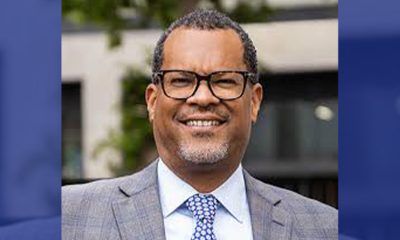Activism
New ‘Street to Home’ Program Expedites Housing People, Reduces Vacancies in City-Funded Homeless Housing in S.F.
“We believe that everyone deserves a safe and stable place to call home,” said Shireen McSpadden San Francisco Director of Homelessness and Supportive Housing. “With Street to Home, we are taking a proactive approach to addressing street homelessness and creating a low barrier way to get people from the street into housing. This pilot program is a testament to our commitment to finding innovative solutions to the challenges our city faces.”

San Francisco Mayor’s Office
The program, which will allow the City to allocate permanent supportive housing units to directly place people from the street into housing, is part of a larger effort to significantly reduce unsheltered homelessness in San Francisco
Mayor London N. Breed announced on Oct. 6 that Street to Home, a new innovative initiative, is expediting the process of providing housing for people experiencing unsheltered homelessness in San Francisco and maximizing the use of existing vacant units in the City’s Homelessness Response System.
The new program, in partnership with Delivering Innovation in Supportive Housing (DISH), is part of the City’s ongoing commitment to bring people inside and connect them to a wide range of existing services and placements.
San Francisco’s Five-Year Strategic Homeless Plan, Home By the Bay, sets a goal of cutting unsheltered homelessness in half over the next five years. This builds on the 15% reduction in unsheltered homelessness San Francisco has seen since 2019.
Breed has directed the Department of Homelessness and Supportive Housing (HSH) to bring forward and implement new initiatives as part of these efforts. By leveraging vacant units within HSH’s portfolio, this program will streamline the process of transitioning individuals from the streets to permanent housing, ensuring a more efficient and compassionate approach.
“Street to Home is all about removing the barriers that slow us from making a real difference for our City and for people living on our streets,” said Breed. “We have to be creative and not let barriers and bureaucracy get in the way of helping people. To build on the success of this pilot, we are advocating to relax federal rules so we can bring this program to more of our buildings across the City.”
HSH has recently piloted Street to Home in June, successfully placing 12 people over a three-week pilot period and, in total, 18 highly vulnerable people have been moved off the streets into long-term housing.
The success of the pilot demonstrates that people living unsheltered are interested in long-term solutions to their homelessness, that housing placements can be expedited, and reducing the number of PSH vacancies in San Francisco is possible by employing creative ideas and getting rid of bureaucracy in the housing placement process.
“We believe that everyone deserves a safe and stable place to call home,” said Shireen McSpadden San Francisco Director of Homelessness and Supportive Housing. “With Street to Home, we are taking a proactive approach to addressing street homelessness and creating a low barrier way to get people from the street into housing. This pilot program is a testament to our commitment to finding innovative solutions to the challenges our city faces.”
As part of Street to Home, the San Francisco Homeless Outreach Team (SFHOT) and the Housing Placement Team will first allocate units and then identify eligible individuals living on the streets. Those who are eligible will be shown a designated available room with the option to sign a lease and move in on the same day. In the interest of moving people more rapidly from the street, documentation will follow this process within 90 days of placement; there will no longer be a requirement to make the initial placement.
Currently Street to Home can only be implemented on locally funded projects due to requirements at the federal level that the City cannot waive. However, the Mayor has requested from HUD that these requirements be waived to allow direct placements into federal projects in order to extend the reach and impact of Street to Home.
“At DISH our number one priority is welcoming people home,” said Lauren Hall, executive director, Delivering Innovation in Supportive Housing (DiSH). “We are thrilled to partner with the City to ensure that our supportive housing programs truly meet people where they are. With this pilot we can cut through processes that can unintentionally leave people on the streets and provide a true solution to being unhoused–a dignified safe place of their own.”
The Street to Home program will prioritize individuals who have been living on the street for an extended period and those who are most vulnerable. By providing direct placement into housing units, the program aims to reduce the trauma and instability associated with homelessness with a path toward stability.
Implementing monthly review of vacancies from provider reports to improve data quality and inform the work.
For more information on San Francisco’s five-year strategic strategy to address homelessness, visit https://hsh.sfgov.org/about/research-and-reports/home-by-the-bay/.
Activism
Gov. Newsom Approves $170 Million to Fast Track Wildfire Resilience
AB 100 approves major investments in regional conservancies across the state, including over $30 million each for the Sierra Nevada, Santa Monica Mountains, State Coastal, and San Gabriel/Lower LA Rivers and Mountains conservancies. An additional $10 million will support wildfire response and resilience efforts.

By Bo Tefu
California Black Media
With wildfire season approaching, last week Gov. Gavin Newsom signed Assembly Bill (AB) 100, unlocking $170 million to fast-track wildfire prevention and forest management projects — many of which directly protect communities of color, who are often hardest hit by climate-driven disasters.
“With this latest round of funding, we’re continuing to increase the speed and size of forest and vegetation management essential to protecting communities,” said Newsom when he announced the funding on April 14.
“We are leaving no stone unturned — including cutting red tape — in our mission to ensure our neighborhoods are protected from destructive wildfires,” he said.
AB 100 approves major investments in regional conservancies across the state, including over $30 million each for the Sierra Nevada, Santa Monica Mountains, State Coastal, and San Gabriel/Lower LA Rivers and Mountains conservancies. An additional $10 million will support wildfire response and resilience efforts.
Newsom also signed an executive order suspending certain regulations to allow urgent work to move forward faster.
This funding builds on California’s broader Wildfire and Forest Resilience Action Plan, a $2.7 billion effort to reduce fuel loads, increase prescribed burning, and harden communities. The state has also launched new dashboards to keep the public informed and hold agencies accountable.
California has also committed to continue investing $200 million annually through 2028 to expand this effort, ensuring long-term resilience, particularly in vulnerable communities.
Activism
California Rideshare Drivers and Supporters Step Up Push to Unionize
Today in California, over 600,000 rideshare drivers want the ability to form or join unions for the sole purpose of collective bargaining or other mutual aid and protection. It’s a right, and recently at the State Capitol, a large number of people, including some rideshare drivers and others working in the gig economy, reaffirmed that they want to exercise it.

By Antonio Ray Harvey
California Black Media
On July 5, 1935, President Franklin D. Roosevelt signed into federal law the National Labor Relations Act (NLRA). Also known as the “Wagner Act,” the law paved the way for employees to have “the right to self-organization, to form, join, or assist labor organizations,” and “to bargain collectively through representatives of their own choosing, according to the legislation’s language.
Today in California, over 600,000 rideshare drivers want the ability to form or join unions for the sole purpose of collective bargaining or other mutual aid and protection. It’s a right, and recently at the State Capitol, a large number of people, including some rideshare drivers and others working in the gig economy, reaffirmed that they want to exercise it.
On April 8, the rideshare drivers held a rally with lawmakers to garner support for Assembly Bill (AB) 1340, the “Transportation Network Company Drivers (TNC) Labor Relations Act.”
Authored by Assemblymembers Buffy Wicks (D-Oakland) and Marc Berman (D-Menlo Park), AB 1340 would allow drivers to create a union and negotiate contracts with industry leaders like Uber and Lyft.
“All work has dignity, and every worker deserves a voice — especially in these uncertain times,” Wicks said at the rally. “AB 1340 empowers drivers with the choice to join a union and negotiate for better wages, benefits, and protections. When workers stand together, they are one of the most powerful forces for justice in California.”
Wicks and Berman were joined by three members of the California Legislative Black Caucus (CLBC): Assemblymembers Tina McKinnor (D-Inglewood), Sade Elhawary (D-Los Angeles), and Isaac Bryan (D-Ladera Heights).
Yvonne Wheeler, president of the Los Angeles County Federation of Labor; April Verrett, President of Service Employees International Union (SEIU); Tia Orr, Executive Director of SEIU; and a host of others participated in the demonstration on the grounds of the state capitol.
“This is not a gig. This is your life. This is your job,” Bryan said at the rally. “When we organize and fight for our collective needs, it pulls from the people who have so much that they don’t know what to do with it and puts it in the hands of people who are struggling every single day.”
Existing law, the “Protect App-Based Drivers and Services Act,” created by Proposition (Prop) 22, a ballot initiative, categorizes app-based drivers for companies such as Uber and Lyft as independent contractors.
Prop 22 was approved by voters in the November 2020 statewide general election. Since then, Prop 22 has been in court facing challenges from groups trying to overturn it.
However, last July, Prop 22 was upheld by the California Supreme Court last July.
In a 2024, statement after the ruling, Lyft stated that 80% of the rideshare drivers they surveyed acknowledged that Prop 22 “was good for them” and “median hourly earnings of drivers on the Lyft platform in California were 22% higher in 2023 than in 2019.”
Wicks and Berman crafted AB 1340 to circumvent Prop 22.
“With AB 1340, we are putting power in the hands of hundreds of thousands of workers to raise the bar in their industry and create a model for an equitable and innovative partnership in the tech sector,” Berman said.
Activism
California Holds the Line on DEI as Trump Administration Threatens School Funding
The conflict began on Feb. 14, when Craig Trainor, acting assistant secretary for civil rights at the U.S. Department of Education (DOE), issued a “Dear Colleague” letter warning that DEI-related programs in public schools could violate federal civil rights law. The letter, which cited Title VI of the Civil Rights Act and the 2023 Supreme Court ruling in Students for Fair Admissions v. Harvard, which ended race-conscious admissions, ordered schools to eliminate race-based considerations in areas such as admissions, scholarships, hiring, discipline, and student programming.

By Joe W. Bowers Jr
California Black Media
California education leaders are pushing back against the Trump administration’s directive to dismantle diversity, equity, and inclusion (DEI) programs in its K-12 public schools — despite threats to take away billions in federal funding.
The conflict began on Feb. 14, when Craig Trainor, acting assistant secretary for civil rights at the U.S. Department of Education (DOE), issued a “Dear Colleague” letter warning that DEI-related programs in public schools could violate federal civil rights law. The letter, which cited Title VI of the Civil Rights Act and the 2023 Supreme Court ruling in Students for Fair Admissions v. Harvard, which ended race-conscious admissions, ordered schools to eliminate race-based considerations in areas such as admissions, scholarships, hiring, discipline, and student programming.
According to Trainor, “DEI programs discriminate against one group of Americans to favor another.”
On April 3, the DOE escalated the pressure, sending a follow-up letter to states demanding that every local educational agency (LEA) certify — within 10 business days — that they were not using federal funds to support “illegal DEI.” The certification requirement, tied to continued federal aid, raised the stakes for California, which receives more than $16 billion annually in federal education funding.
So far, California has refused to comply with the DOE order.
“There is nothing in state or federal law that outlaws the broad concepts of ‘diversity,’ ‘equity,’ or ‘inclusion,’” wrote David Schapira, California’s Chief Deputy Superintendent of Public Instruction, in an April 4 letter to superintendents and charter school administrators. Schapira noted that all of California’s more than 1,000 traditional public school districts submit Title VI compliance assurances annually and are subject to regular oversight by the state and the federal government.
In a formal response to the DOE on April 11, the California Department of Education, the State Board of Education, and State Superintendent of Public Instruction Tony Thurmond collectively rejected the certification demand, calling it vague, legally unsupported, and procedurally improper.
“California and its nearly 2,000 LEAs (including traditional public schools and charter schools) have already provided the requisite guarantee that its programs and services are, and will be, in compliance with Title VI and its implementing regulation,” the letter says.
Thurmond added in a statement, “Today, California affirmed existing and continued compliance with federal laws while we stay the course to move the needle for all students. As our responses to the United States Department of Education state and as the plain text of state and federal laws affirm, there is nothing unlawful about broad core values such as diversity, equity and inclusion. I am proud of our students, educators and school communities who continue to focus on teaching and learning, despite federal actions intended to distract and disrupt.”
California officials say that the federal government cannot change existing civil rights enforcement standards without going through formal rule-making procedures, which require public notice and comment.
Other states are taking a similar approach. In a letter to the DOE, Daniel Morton-Bentley, deputy commissioner and counsel for the New York State Education Department, wrote, “We understand that the current administration seeks to censor anything it deems ‘diversity, equity & inclusion.’ But there are no federal or State laws prohibiting the principles of DEI.”
-

 Activism4 weeks ago
Activism4 weeks agoOakland Post Endorses Barbara Lee
-

 Activism3 weeks ago
Activism3 weeks agoOakland Post: Week of April 2 – 8, 2025
-

 #NNPA BlackPress3 weeks ago
#NNPA BlackPress3 weeks agoTrump Profits, Black America Pays the Price
-

 Activism2 weeks ago
Activism2 weeks agoOakland Post: Week of April 9 – 15, 2025
-

 #NNPA BlackPress3 weeks ago
#NNPA BlackPress3 weeks agoHarriet Tubman Scrubbed; DEI Dismantled
-

 #NNPA BlackPress3 weeks ago
#NNPA BlackPress3 weeks agoTrump Targets a Slavery Removal from the National Museum of African-American History and Culture
-

 #NNPA BlackPress3 weeks ago
#NNPA BlackPress3 weeks agoLawmakers Greenlight Reparations Study for Descendants of Enslaved Marylanders
-

 #NNPA BlackPress3 weeks ago
#NNPA BlackPress3 weeks agoNew York Stands Firm Against Trump Administration’s Order to Abandon Diversity in Schools

























































